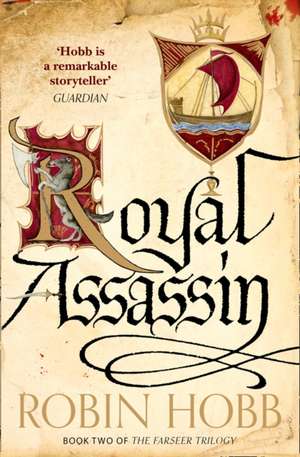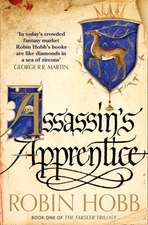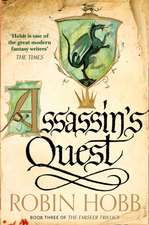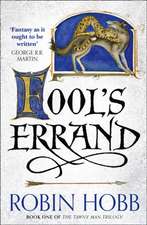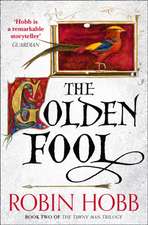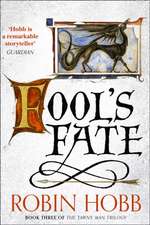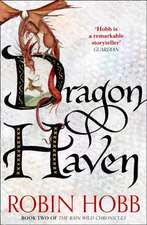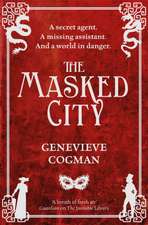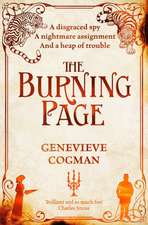Royal Assassin: The Farseer Trilogy, cartea 2
Autor Robin Hobben Limba Engleză Paperback – 27 mar 2014
| Toate formatele și edițiile | Preț | Express |
|---|---|---|
| Paperback (3) | 59.05 lei 3-5 săpt. | +13.11 lei 7-13 zile |
| Bantam Books – 31 ian 1997 | 59.05 lei 3-5 săpt. | +13.11 lei 7-13 zile |
| HarperCollins Publishers – 27 mar 2014 | 72.09 lei 3-5 săpt. | +18.12 lei 7-13 zile |
| PENGUIN RANDOM HOUSE LLC – 29 aug 2023 | 127.66 lei 3-5 săpt. | |
| Hardback (1) | 281.34 lei 3-5 săpt. | +61.92 lei 7-13 zile |
| HarperCollins Publishers – 25 iun 2020 | 281.34 lei 3-5 săpt. | +61.92 lei 7-13 zile |
Preț: 72.09 lei
Nou
Puncte Express: 108
Preț estimativ în valută:
13.79€ • 14.40$ • 11.42£
13.79€ • 14.40$ • 11.42£
Carte disponibilă
Livrare economică 14-28 martie
Livrare express 28 februarie-06 martie pentru 28.11 lei
Preluare comenzi: 021 569.72.76
Specificații
ISBN-13: 9780007562268
ISBN-10: 0007562268
Pagini: 648
Dimensiuni: 126 x 195 x 48 mm
Greutate: 0.44 kg
Editura: HarperCollins Publishers
Colecția HarperVoyager
Seria The Farseer Trilogy
ISBN-10: 0007562268
Pagini: 648
Dimensiuni: 126 x 195 x 48 mm
Greutate: 0.44 kg
Editura: HarperCollins Publishers
Colecția HarperVoyager
Seria The Farseer Trilogy
Descriere scurtă
'Fantasy
as
it
ought
to
be
written'
George
R.R.
Martin
The
second
volume
in
Robin
Hobb's
internationally
bestselling
Farseer
Trilogy.
Descriere
'Fantasy as it ought to be written' George R.R. Martin The second volume in Robin Hobb's internationally bestselling Farseer Trilogy.
Extras
Prologue: Dreams and Awakenings
Why is it forbidden to write down specific knowledge of the magics? Perhaps because we all fear that such knowledge would fall into the hands of one not worthy to use it. Certainly there has always been a system of apprenticeship to ensure that specific knowledge of magic is passed only to those trained and judged worthy of such knowledge. While this seems a laudable attempt to protect us from unworthy practitioners of arcane lore, it ignores the fact that the magics are not derived from this specific knowledge. The predilection for a certain type of magic is either inborn or lacking. For instance, the ability for the magics known as the Skill is tied closely to blood relationship to the royal Farseer line, though it may also occur as a 'wild strain' amongst folk whose ancestors came from both the Inland tribes and the Outislanders. One trained in the Skill is able to reach out to another's mind, no matter how distant, and know what he is thinking. Those who are strongly Skilled can influence that thinking, or have converse with that person. For the conducting of a battle, or the gathering of information, it is a most useful tool.
Folklore tells of an even older magic, much despised now, known as the Wit. Few will admit a talent for this magic, hence it is always said to be the province of the folk in the next valley or the ones who live on the other side of the far ridge. I suspect it was once the natural magic of those who lived on the land as hunters rather than as settled folk; a magic for those who felt kinship with the wild beasts of the woods. The Wit, it is said, gave one the ability to speak the tongues of the beasts. It was also warned that those who practiced the Wit too long or too well became whatever beast they had bonded to. But this may be only legend.
There are the Hedge magics, though I have never been able to determine the source of this name. These are magics both verified and suspect, including palm reading, water gazing, the interpretation of crystal reflections, and a host of other magics that attempt to predict the future. In a separate unnamed category are the magics that cause physical effects, such as invisibility, levitation, giving motion or life to inanimate objects--all the magics of the old legends, from the Flying Chair of the Widow's Son to the North Wind's magic tablecloth. I know of no people who claim these magics as their own. They seem to be solely the stuff of legend, ascribed to folk living in ancient times or distant places, or beings of mythical or near mythical reputation: dragons, giants, the Elderlings, the Others, pecksies.
I pause to clean my pen. My writing wanders from spidery to blobbish on this poor paper. But I will not use good parchment for these words; not yet. I am not sure they should be written. I ask myself, why put this to paper at all? Will not this knowledge be passed down by word of mouth to those who are worthy? Perhaps. But perhaps not. What we take for granted now, the knowing of these things, may be a wonder and a mystery someday to our descendants.
There is very little in any of the libraries on magic. I work laboriously, tracing a thread of knowledge through a patchwork quilt of information. I find scattered references, passing allusions, but that is all. I have gathered it, over these last few years, and stored it in my head, always intending to commit my knowledge to paper. I will put down what I know from my own experience, as well as what I have ferreted out. To perhaps provide answers for some other poor fool, in times to come, who might find himself as battered by the warring of the magics within him as I have been.
But when I sit down to the task, I hesitate. Who am I to set my will against the wisdom of those who have gone before me? Shall I set down in plain lettering the methods by which a Wit gifted one can expand her range, or can bond a creature to himself? Shall I detail the training one must undergo before being recognized as a Skilled one? The Hedge wizardries and legendary magics have never been mine. Have I any right to dig out their secrets and pin them to paper like so many butterflies or leaves collected for study?
I try to consider what one might do with such knowledge, unjustly gained. It leads me to consider what this knowledge has gained for me. Power, wealth, the love of a woman? I mock myself. Neither the Skill nor the Wit has ever offered any such to me. Or if they did, I had not the sense nor ambition to seize them when offered.
Power. I do not think I ever wanted it for its own sake. I thirsted for it, sometimes, when I was ground down, or when those close to me suffered beneath ones who abused their powers. Wealth. I never really considered it. From the moment that I, his bastard grandson, pledged myself to King Shrewd, he always saw that all my needs were fulfilled. I had plenty to eat, more education than I sometimes cared for, clothes both simple and those annoyingly fashionable, and often enough a coin or two of my own to spend. Growing up in Buckkeep, that was wealth enough and more than most boys in Buckkeep Town could claim. Love? Well. My horse Sooty was fond enough of me, in her own placid way. I had the true hearted loyalty of a hound named Nosy, and that took him to his grave. I was given the fiercest of loves by a terrier pup, and it was likewise the death of him. I wince to think of the price willingly paid for loving me.
Always I have possessed the loneliness of one raised amidst intrigues and clustering secrets, the isolation of a boy who can not trust the completeness of his heart to anyone. I could not go to Fedwren, the court Scribe who praised me for my neat lettering and well inked illustrations, and confide that I was already apprenticed to the Royal Assassin, and thus could not follow his writing trade. Nor could I divulge to Chade, my master in the Diplomacy of the Knife, the frustrating brutality I endured trying to learn the ways of the Skill from Galen the Skill Master. And to no one did I dare speak openly of my emerging proclivity for the Wit, the ancient beast magic, said to be a perversion and a taint to any who used it.
Not even to Molly.
Molly was that most cherished of items: a genuine refuge. She had absolutely nothing to do with my day to day life. It was not just that she was female, though that was mystery enough to me. I was raised almost entirely in the company of men, bereft not only of my natural mother and father, but of any blood relations that would openly acknowledge me. As a child, my care was entrusted to Burrich, the gruff Stablemaster who had once been my father's right hand man. The stable hands and the guards were my daily companions. Then as now, there were women in the guard companies, though not so many then as now. But like their male comrades, they had duties to perform, and lives and families of their own when they were not on watch. I could not claim their time. I had no mother, nor sisters or aunts of my own. There were no women who offered me the special tenderness said to be the province of women.
None save Molly.
She was but a year or two older than myself, and growing the same way a sprig of greenery forces its way up through a gap in the cobblestones. Neither her father's near constant drunkenness and frequent brutality nor the grinding chores of a child trying to maintain the pretense of both home and family business could crush her. When I first met her, she was as wild and wary as a fox cub. Molly NoseBleed she was called among the street children. She often bore the marks of the beatings her father gave her. Despite his cruelty, she cared for him. I never understood that. He would grumble and berate her even as she tottered him home after one of his binges and put him to bed. And when he awoke, he never had any remorse for his drunkenness and harsh words. There were only more criticisms: Why hadn't the chandlery been swept and fresh strewing herbs put on the floor? Why hadn't she tended the bee hives, when they were nearly out of honey to sell? Why had she let the fire go out under the tallow pot? I was mute witness more times than I care to remember.
But through it all, Molly grew. She flowered, one sudden summer, into a young woman who left me in awe of her capable ways and womanly charms. For her part, she seemed totally unaware of how her eyes could meet mine and turn my tongue to leather in my mouth. No magic I possessed, no Skill, no Wit, was proof against the accidental touch of her hand against mine, nor could defend me against the awkwardness that overwhelmed me at the quirk of her smile.
Should I catalog her hair flowing with the wind, or detail how the color of her eyes shifted from dark amber to rich brown depending on her mood and the color of her gown? I would catch a glimpse of her scarlet skirts and red shawl amongst the market throng, and suddenly be aware of no one else. These are magics I witnessed, and though I might set them down on paper, no other could ever work them with such skill.
How did I court her? With a boy's clumsy gallantries, gaping after her like a simpleton watching the whirling discs of a juggler. She knew I loved her before I did. And she let me court her, although I was a few years younger than she, and not one of the town boys and possessed of small prospects as far as she knew. She thought I was the scribe's errand boy, a part time helper in the stables, a Keep runner. She never suspected I was the Bastard, the unacknowledged son that had toppled Prince Chivalry from his place in the line of succession. That alone was a big enough secret. Of my magics and my other profession, she knew nothing. Maybe that was why I could love her.
It was certainly why I lost her.
Why is it forbidden to write down specific knowledge of the magics? Perhaps because we all fear that such knowledge would fall into the hands of one not worthy to use it. Certainly there has always been a system of apprenticeship to ensure that specific knowledge of magic is passed only to those trained and judged worthy of such knowledge. While this seems a laudable attempt to protect us from unworthy practitioners of arcane lore, it ignores the fact that the magics are not derived from this specific knowledge. The predilection for a certain type of magic is either inborn or lacking. For instance, the ability for the magics known as the Skill is tied closely to blood relationship to the royal Farseer line, though it may also occur as a 'wild strain' amongst folk whose ancestors came from both the Inland tribes and the Outislanders. One trained in the Skill is able to reach out to another's mind, no matter how distant, and know what he is thinking. Those who are strongly Skilled can influence that thinking, or have converse with that person. For the conducting of a battle, or the gathering of information, it is a most useful tool.
Folklore tells of an even older magic, much despised now, known as the Wit. Few will admit a talent for this magic, hence it is always said to be the province of the folk in the next valley or the ones who live on the other side of the far ridge. I suspect it was once the natural magic of those who lived on the land as hunters rather than as settled folk; a magic for those who felt kinship with the wild beasts of the woods. The Wit, it is said, gave one the ability to speak the tongues of the beasts. It was also warned that those who practiced the Wit too long or too well became whatever beast they had bonded to. But this may be only legend.
There are the Hedge magics, though I have never been able to determine the source of this name. These are magics both verified and suspect, including palm reading, water gazing, the interpretation of crystal reflections, and a host of other magics that attempt to predict the future. In a separate unnamed category are the magics that cause physical effects, such as invisibility, levitation, giving motion or life to inanimate objects--all the magics of the old legends, from the Flying Chair of the Widow's Son to the North Wind's magic tablecloth. I know of no people who claim these magics as their own. They seem to be solely the stuff of legend, ascribed to folk living in ancient times or distant places, or beings of mythical or near mythical reputation: dragons, giants, the Elderlings, the Others, pecksies.
I pause to clean my pen. My writing wanders from spidery to blobbish on this poor paper. But I will not use good parchment for these words; not yet. I am not sure they should be written. I ask myself, why put this to paper at all? Will not this knowledge be passed down by word of mouth to those who are worthy? Perhaps. But perhaps not. What we take for granted now, the knowing of these things, may be a wonder and a mystery someday to our descendants.
There is very little in any of the libraries on magic. I work laboriously, tracing a thread of knowledge through a patchwork quilt of information. I find scattered references, passing allusions, but that is all. I have gathered it, over these last few years, and stored it in my head, always intending to commit my knowledge to paper. I will put down what I know from my own experience, as well as what I have ferreted out. To perhaps provide answers for some other poor fool, in times to come, who might find himself as battered by the warring of the magics within him as I have been.
But when I sit down to the task, I hesitate. Who am I to set my will against the wisdom of those who have gone before me? Shall I set down in plain lettering the methods by which a Wit gifted one can expand her range, or can bond a creature to himself? Shall I detail the training one must undergo before being recognized as a Skilled one? The Hedge wizardries and legendary magics have never been mine. Have I any right to dig out their secrets and pin them to paper like so many butterflies or leaves collected for study?
I try to consider what one might do with such knowledge, unjustly gained. It leads me to consider what this knowledge has gained for me. Power, wealth, the love of a woman? I mock myself. Neither the Skill nor the Wit has ever offered any such to me. Or if they did, I had not the sense nor ambition to seize them when offered.
Power. I do not think I ever wanted it for its own sake. I thirsted for it, sometimes, when I was ground down, or when those close to me suffered beneath ones who abused their powers. Wealth. I never really considered it. From the moment that I, his bastard grandson, pledged myself to King Shrewd, he always saw that all my needs were fulfilled. I had plenty to eat, more education than I sometimes cared for, clothes both simple and those annoyingly fashionable, and often enough a coin or two of my own to spend. Growing up in Buckkeep, that was wealth enough and more than most boys in Buckkeep Town could claim. Love? Well. My horse Sooty was fond enough of me, in her own placid way. I had the true hearted loyalty of a hound named Nosy, and that took him to his grave. I was given the fiercest of loves by a terrier pup, and it was likewise the death of him. I wince to think of the price willingly paid for loving me.
Always I have possessed the loneliness of one raised amidst intrigues and clustering secrets, the isolation of a boy who can not trust the completeness of his heart to anyone. I could not go to Fedwren, the court Scribe who praised me for my neat lettering and well inked illustrations, and confide that I was already apprenticed to the Royal Assassin, and thus could not follow his writing trade. Nor could I divulge to Chade, my master in the Diplomacy of the Knife, the frustrating brutality I endured trying to learn the ways of the Skill from Galen the Skill Master. And to no one did I dare speak openly of my emerging proclivity for the Wit, the ancient beast magic, said to be a perversion and a taint to any who used it.
Not even to Molly.
Molly was that most cherished of items: a genuine refuge. She had absolutely nothing to do with my day to day life. It was not just that she was female, though that was mystery enough to me. I was raised almost entirely in the company of men, bereft not only of my natural mother and father, but of any blood relations that would openly acknowledge me. As a child, my care was entrusted to Burrich, the gruff Stablemaster who had once been my father's right hand man. The stable hands and the guards were my daily companions. Then as now, there were women in the guard companies, though not so many then as now. But like their male comrades, they had duties to perform, and lives and families of their own when they were not on watch. I could not claim their time. I had no mother, nor sisters or aunts of my own. There were no women who offered me the special tenderness said to be the province of women.
None save Molly.
She was but a year or two older than myself, and growing the same way a sprig of greenery forces its way up through a gap in the cobblestones. Neither her father's near constant drunkenness and frequent brutality nor the grinding chores of a child trying to maintain the pretense of both home and family business could crush her. When I first met her, she was as wild and wary as a fox cub. Molly NoseBleed she was called among the street children. She often bore the marks of the beatings her father gave her. Despite his cruelty, she cared for him. I never understood that. He would grumble and berate her even as she tottered him home after one of his binges and put him to bed. And when he awoke, he never had any remorse for his drunkenness and harsh words. There were only more criticisms: Why hadn't the chandlery been swept and fresh strewing herbs put on the floor? Why hadn't she tended the bee hives, when they were nearly out of honey to sell? Why had she let the fire go out under the tallow pot? I was mute witness more times than I care to remember.
But through it all, Molly grew. She flowered, one sudden summer, into a young woman who left me in awe of her capable ways and womanly charms. For her part, she seemed totally unaware of how her eyes could meet mine and turn my tongue to leather in my mouth. No magic I possessed, no Skill, no Wit, was proof against the accidental touch of her hand against mine, nor could defend me against the awkwardness that overwhelmed me at the quirk of her smile.
Should I catalog her hair flowing with the wind, or detail how the color of her eyes shifted from dark amber to rich brown depending on her mood and the color of her gown? I would catch a glimpse of her scarlet skirts and red shawl amongst the market throng, and suddenly be aware of no one else. These are magics I witnessed, and though I might set them down on paper, no other could ever work them with such skill.
How did I court her? With a boy's clumsy gallantries, gaping after her like a simpleton watching the whirling discs of a juggler. She knew I loved her before I did. And she let me court her, although I was a few years younger than she, and not one of the town boys and possessed of small prospects as far as she knew. She thought I was the scribe's errand boy, a part time helper in the stables, a Keep runner. She never suspected I was the Bastard, the unacknowledged son that had toppled Prince Chivalry from his place in the line of succession. That alone was a big enough secret. Of my magics and my other profession, she knew nothing. Maybe that was why I could love her.
It was certainly why I lost her.
Notă biografică
Robin Hobb is the author of the Farseer Trilogy, the Liveship Traders Trilogy, the Tawny Man Trilogy, the Soldier Son Trilogy, and the Rain Wilds Chronicles. She has also written as Megan Lindholm. She is a native of Washington State.
